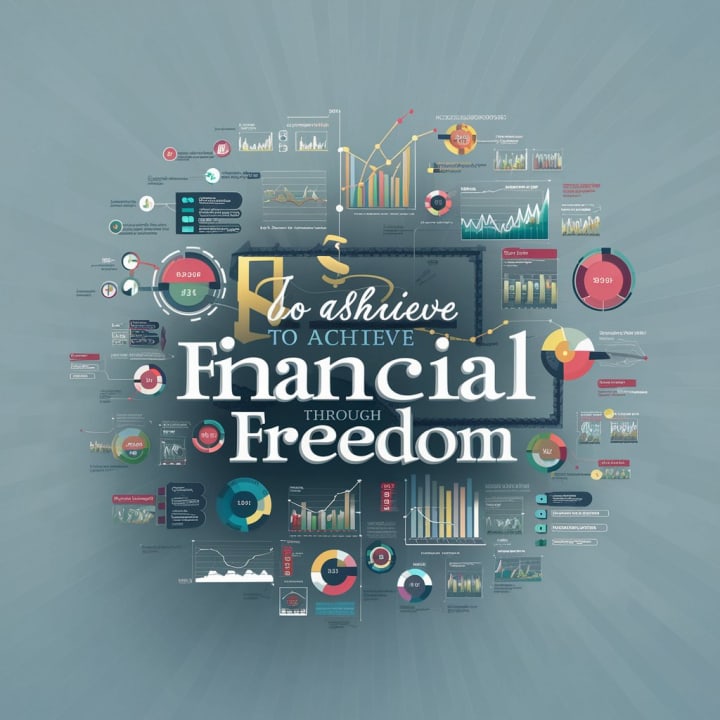How to Achieve Financial Freedom by Investing Wisely
Smart Investment Strategies for Long-Term Wealth

Achieving financial freedom is a dream many aspire to. It signifies a state where you no longer worry about money because your investments generate enough income to support your lifestyle.
One of the most effective ways to reach this goal is through wise investing. This article will delve into smart investment strategies that can help you build long-term wealth and achieve financial freedom.
Understanding Financial Freedom
Financial freedom means having sufficient savings, investments, and cash to afford the lifestyle you desire.
It also includes having the financial cushion to deal with emergencies and the freedom to make choices that aren't driven solely by financial concerns.
Key Elements of Financial Freedom
1. **Debt-Free Living:** Reducing or eliminating debt is crucial. High-interest debts can hinder your ability to save and invest.
2. **Emergency Fund:** Having 3-6 months of living expenses saved can prevent financial setbacks from derailing your progress.
3. **Consistent Income:** Generating a stable income through employment, business, or passive investments is essential.
4. **Smart Investing:** Investing wisely to grow your wealth over time is the cornerstone of achieving financial freedom.

Why Investing is Essential
Investing is crucial because it allows your money to work for you. Instead of your earnings sitting idle in a savings account, investing helps grow your wealth through compound interest, dividends, and capital gains.
Benefits of Investing
1. **Wealth Accumulation:** Investments can grow your wealth significantly over time.
2. **Passive Income:** Investments such as stocks, bonds, and real estate can provide regular passive income.
3. **Inflation Hedge:** Investing can help protect your purchasing power against inflation.
4. **Financial Security:** A well-diversified investment portfolio can provide financial security and peace of mind.
Steps to Start Investing Wisely
1. Educate Yourself
Knowledge is power, especially when it comes to investing. Understanding different types of investments and how they work is crucial for making informed decisions.
**Key Areas to Study:**
- Stock Market Basics
- Bonds and Fixed-Income Investments
- Real Estate Investment
- Mutual Funds and ETFs
- Retirement Accounts (401(k), IRA)
- Risk Management and Diversification

2. Set Clear Financial Goals
Determine what you want to achieve with your investments. Clear goals will guide your investment strategy and help you stay focused.
**Examples of Financial Goals:**
- Saving for Retirement
- Building an Emergency Fund
- Saving for a Major Purchase (e.g., house, car)
- Funding Children's Education
- Achieving Financial Independence
3. Create a Budget and Save
Before you can invest, you need to save money. Creating a budget helps you identify how much you can save each month.
**Steps to Create a Budget:**
- Track Your Income and Expenses
- Identify Areas to Cut Back
- Allocate Funds for Savings and Investments
- Stick to Your Budget
4. Build an Emergency Fund
Having an emergency fund is a critical step before you start investing. This fund should cover 3-6 months of living expenses and be easily accessible.
5. Choose the Right Investment Accounts
Different accounts offer various tax advantages and benefits. Choose the ones that best suit your goals.
**Types of Investment Accounts:**
- **Tax-Advantaged Accounts:** 401(k), IRA, Roth IRA
- **Taxable Brokerage Accounts:** Ideal for flexible investing
- **Education Savings Accounts:** 529 plans for education expenses

6. Diversify Your Portfolio
Diversification involves spreading your investments across different asset classes to reduce risk. A diversified portfolio is less likely to suffer significant losses.
**Asset Classes to Consider:**
- **Stocks:** Equity investments offering high growth potential
- **Bonds:** Fixed-income securities providing regular interest payments
- **Real Estate:** Property investments for rental income and appreciation
- **Commodities:** Physical goods like gold, silver, and oil
- **Mutual Funds/ETFs:** Pooled investments offering diversification
7. Understand Your Risk Tolerance
Risk tolerance varies from person to person. Assessing your risk tolerance helps you choose investments that match your comfort level.
**Factors Influencing Risk Tolerance:**
- Age and Investment Horizon
- Income Stability
- Financial Goals
- Personal Comfort with Market Fluctuations
8. Invest Regularly
Consistency is key in investing. Regular contributions to your investment accounts can significantly enhance your wealth over time.

Strategies for Regular Investing:**
- **Dollar-Cost Averaging:** Investing a fixed amount regularly, regardless of market conditions
- **Automatic Contributions:** Setting up automatic transfers to your investment accounts
Smart Investment Strategies for Long-Term Wealth
1. Index Funds and ETFs
Index funds and ETFs (Exchange-Traded Funds) are excellent options for long-term investors. They offer low fees, diversification, and exposure to broad market indices.
**Benefits:**
- Low Expense Ratios
- Diversification Across Many Stocks
- Passive Management
2. Dividend Growth Investing
Investing in dividend-paying stocks can provide a steady income stream and potential for capital appreciation.
**Key Points:**
- Look for Companies with Strong Dividend Histories
- Reinvest Dividends to Accelerate Growth
- Focus on Dividend Growth Rate and Yield
3. Real Estate Investment
Real estate can be a lucrative investment, offering rental income and potential for property value appreciation.
**Types of Real Estate Investments:**
- Residential Properties
- Commercial Properties
- Real Estate Investment Trusts (REITs)
4. Bond Investing
Bonds are a safer investment option compared to stocks, providing regular interest payments and lower risk.
**Types of Bonds:**
- Government Bonds (e.g., Treasury Bonds)
- Corporate Bonds
- Municipal Bonds

5. Retirement Accounts
Maximize contributions to tax-advantaged retirement accounts like 401(k)s and IRAs. These accounts offer significant tax benefits and help you save for retirement.
6. Dollar-Cost Averaging
Dollar-cost averaging involves regularly investing a fixed amount of money into the market, regardless of its current state. This strategy can reduce the impact of volatility and lower the average cost of your investments over time.
7. Rebalancing Your Portfolio
Regularly rebalancing your portfolio ensures that it remains aligned with your risk tolerance and investment goals. This involves selling overperforming assets and buying underperforming ones to maintain your desired asset allocation.
8. Invest in Yourself
Investing in education and skill development can significantly boost your earning potential and open up new opportunities.
**Ways to Invest in Yourself:**
- Pursue Higher Education
- Attend Workshops and Conferences
- Develop New Skills through Online Courses
Monitoring and Adjusting Your Investments
Regularly Review Your Portfolio
Regularly reviewing your portfolio helps you stay on track with your financial goals. Make adjustments based on changes in your financial situation or market conditions.
Stay Informed
Stay updated with market trends and economic news. Understanding the broader economic environment can help you make informed investment decisions.
Seek Professional Advice
If you're unsure about your investment strategy, consider seeking advice from a financial advisor. A professional can provide personalized guidance and help you optimize your investment plan.

Conclusion
Achieving financial freedom through wise investing is a journey that requires education, planning, and discipline. By setting clear financial goals, creating a budget, diversifying your portfolio, and staying informed, you can build long-term wealth and achieve financial freedom.
Remember, the key to successful investing is to start early, stay consistent, and make informed decisions.
By following these strategies and principles, you can embark on a successful path to achieving financial freedom and long-term wealth.
#FinancialFreedom, #InvestWisely, #SmartInvesting, #LongTermWealth, #InvestmentStrategies, #StockMarket, #RealEstateInvestment, #DividendInvesting, #RetirementPlanning, #PassiveIncome, #PortfolioDiversification, #FinancialGoals, #DollarCostAveraging, #WealthBuilding, #PersonalFinance
About the Creator
Sherif Saad
Hey there, fellow word enthusiasts! I'm Sherif, and I'm thrilled to embark on this creative journey with you
I'm a passionate writer with a love for storytelling that knows no bounds diving into the world of words.
Enjoyed the story? Support the Creator.
Subscribe for free to receive all their stories in your feed. You could also pledge your support or give them a one-off tip, letting them know you appreciate their work.
Reader insights
Nice work
Very well written. Keep up the good work!
Top insights
Compelling and original writing
Creative use of language & vocab
Easy to read and follow
Well-structured & engaging content






Comments (1)
good very useful